Opportunity For Education
in Mozambique
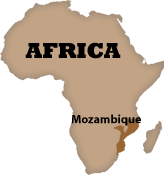 Mozambique is a country roughly twice the size of the state of California situated in sub-Saharan Africa, South of the equator where most days the sun shines and the weather is beautiful. Considered as a developing country where 79% of its population earns less than USD$ 2.00 per day, this country has yet to develop its electrical grid to accomodate rural and semi-rural settings of which the majority have no access to commercially produced electricity.
Mozambique is a country roughly twice the size of the state of California situated in sub-Saharan Africa, South of the equator where most days the sun shines and the weather is beautiful. Considered as a developing country where 79% of its population earns less than USD$ 2.00 per day, this country has yet to develop its electrical grid to accomodate rural and semi-rural settings of which the majority have no access to commercially produced electricity.
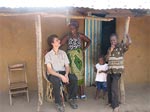 |
CEO Jens Naumann spends a Sunday
(December 2006) with Atrazenha and her children...
Atrazenha is a single mother of 5, living in a classy earthen home maticulously constructed in the village of Lamego. Although some sections of Lamego have access to electricity, her zone does not, and neither would she be willing to pay the monthly electricity bill with her $2.10 / week salary. When the sun sets at 5:30pm, her house is dark until the following morning. |
In Mozambique,the consumption of electricity per household is very small compared to that of a household in a developed country. Whereas the average home in North America demands an electrical service of 200 amperes at 230 VAC, an average rural household in Mozambique would excel significantly in quality of life having a 20 - 40 Watt electrical system with 12V output voltage. This quantity of power would be sufficient to ensure three principle applications:
- lighting for the evening hours using high-efficiency LED technology
- cell phone battery charging
- local and international band radio receiver for entertainment, exposure to the official language, and keeping informed to current affairs.
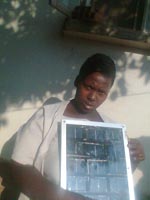 |
Student Misaria of the district of Chibuto
displays completed educational PV panel... |
Despite realizing the significance of providing a limited amount of PV power for households in rural Mozambique, to simply distribute PV panel and battery storage components to people yet unfamiliar in the field of renewable energy and electricity is not a practical solution to the current rural power crisis. Electricity coming from high-current storage batteries is unforgiving of misuse and can easily cause injury and destruction. It is vital that a comprehensive and thorough education be provided in this field, offering a good understanding of the proper use,component assembly, and maintenance of a home PV-electrical system.
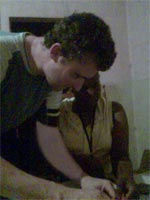 |
Angelina is one of several totally blind schoolteachers who graduated from Humana's EPF teacher-training program.... Grade 6 schoolteacher Angelina Mandlhate (Chibuto, Dec 2008) is taught the assembly of the Junior DIY kit so she may teach her 55 students the fundamentals of renewable energy |
Green-First Technologies Inc. is working closely with a select schoolteacher of the district of Chibuto in a pilot project in which grade 5 students are taught the fundamentals of PV power systems using practical, hands-on training incorporating the use of the Junior-DIY kit and other pertinent components. The education is presented in school as a special science subject.
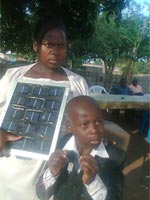 |
Testing the completed panel...
Using a small electric motor to demonstrate real power output, students experiment with the direction of the sun as well as the significance of individual cell shading during this experiment. |
Please check with us for further updates on this and other development projects. Should you have comments or suggestions, please write us at info@green-first.com